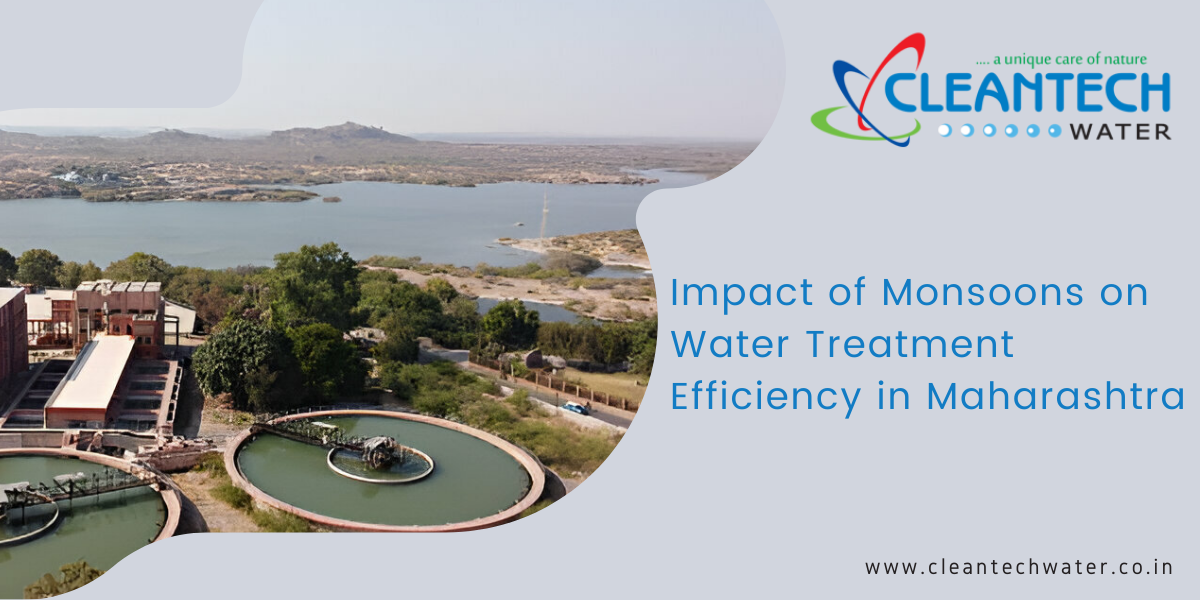Maharashtra, one of India’s most industrialized and populous states, faces significant challenges in managing water resources. Given the rapid urbanization and industrial growth, the state has seen an increasing need for efficient water treatment systems to ensure a safe and reliable water supply. The monsoon season, which brings substantial rainfall to the region, plays a crucial role in influencing the efficiency and operations of water treatment plants. This article explores the impact of monsoons on water treatment efficiency in Maharashtra, providing valuable insights for businesses operating or looking to invest in sewage treatment plants in the state.

Monsoon Timeline and Intensity in Maharashtra
Maharashtra experiences the onset of the southwest monsoon around early June, with the intensity peaking in July and August. The state’s geographical diversity, including coastal areas, the Western Ghats, and the central plateau, results in varying rainfall patterns across different regions. Coastal areas like Mumbai and Konkan receive heavy rainfall, often exceeding 2000 mm annually, while central and eastern parts receive moderate to lower rainfall.
Historical Data on Rainfall Patterns
Historical rainfall data indicates significant variability in monsoon intensity and distribution in Maharashtra. Over the past few decades, there have been instances of both droughts and excessive rainfall, each posing unique challenges for water management. For example, the floods in Mumbai during the 2005 monsoon season highlighted the need for robust water treatment and drainage systems. Conversely, years with below-average rainfall strain the existing water treatment infrastructure, emphasizing the importance of adaptive and resilient systems.
Water Treatment Plants in Maharashtra
Types of Water Treatment Plants (WTPs)
Water treatment plants in Maharashtra are essential for providing clean and safe water for domestic, industrial, and agricultural use. These plants can be broadly classified into two types based on their source of water:
Surface Water Treatment Plants
Surface water treatment plants primarily treat water from rivers, lakes, and reservoirs. These plants are crucial in regions with abundant surface water sources, particularly during the monsoon season when surface water availability is at its peak. The treatment process involves multiple stages to remove physical, chemical, and biological contaminants, ensuring the water meets the required standards for various uses.
Groundwater Treatment Plants
Groundwater treatment plants focus on treating water extracted from aquifers. In Maharashtra, groundwater is a vital source, especially in regions with limited surface water availability. Groundwater treatment often addresses issues like high mineral content, including hardness and salinity, which can affect the water’s suitability for consumption and industrial use.
Key Processes in Water Treatment
Effective water treatment involves a series of processes designed to remove contaminants and ensure water safety and quality. Key processes in water treatment include:
Coagulation and Flocculation
Coagulation involves adding chemicals (coagulants) to the water to neutralize charges and form small clumps of contaminants. Flocculation follows, where gentle mixing causes these small clumps to aggregate into larger particles (flocs), which can be more easily removed in subsequent treatment stages.
Sedimentation
During sedimentation, the flocs formed in the coagulation and flocculation stage settle at the bottom of a sedimentation tank due to gravity. This process effectively reduces the suspended solids in the water, making the filtration process more efficient.
Filtration
Filtration involves passing water through a medium (e.g., sand, gravel, or activated carbon) to remove remaining particles, including microorganisms. This step is crucial for ensuring the water is free from physical impurities and ready for disinfection.
Disinfection
Disinfection is the final step in the treatment process, aiming to eliminate any remaining pathogens. Common disinfection methods include chlorination, ultraviolet (UV) radiation, and ozonation. This step ensures the treated water is safe for human consumption and other uses.
Current State and Capacity of Water Treatment Plants in Maharashtra
Maharashtra’s water treatment infrastructure includes numerous surface and groundwater treatment plants, varying in capacity and technology. While major cities like Mumbai, Pune, and Nagpur have well-established systems, rural and peri-urban areas often face challenges due to limited infrastructure and resources. The monsoon season significantly impacts these systems, influencing water availability, quality, and treatment efficiency. Upgrading and expanding water treatment plants in Maharashtra is crucial to meet the growing demand and ensure resilience against monsoon-related challenges.
Impact of Monsoons on Water Sources
Increased Turbidity and Sediment Load
Monsoons bring substantial rainfall, which significantly affects the turbidity and sediment load of water sources. The heavy rains cause soil erosion and surface runoff, introducing a large amount of suspended particles into rivers, lakes, and reservoirs. This increased turbidity poses a significant challenge for water treatment plants in Maharashtra, as higher turbidity levels complicate the coagulation and filtration processes, necessitating adjustments in treatment protocols to maintain water quality.
Runoff and Contamination of Water Sources
Monsoon-induced runoff is a double-edged sword. While it replenishes water bodies, it also brings various contaminants into the water supply. Agricultural runoff often carries fertilizers, pesticides, and other chemicals, while urban runoff can include oil, heavy metals, and other pollutants from roadways and industrial areas. These contaminants can degrade the water quality, requiring more intensive treatment processes. For wastewater treatment plants in Maharashtra, the increased contaminant load means higher operational costs and the need for more robust treatment technologies to meet safety standards.
Changes in Water Quality Parameters
Monsoon rains can also lead to significant changes in water quality parameters such as pH, microbial content, and dissolved oxygen levels. The influx of organic matter and nutrients from runoff can increase microbial activity, leading to higher levels of bacteria and other pathogens in the water. Additionally, the dilution effect of the rainfall can alter the pH levels, affecting the effectiveness of chemical treatment processes. These changes necessitate continuous monitoring and adjustment of treatment protocols to ensure the treated water meets quality standards.
Challenges to Water Treatment During Monsoons
Overloading of Treatment Plants Due to Increased Water Volume
The monsoon season can lead to the overloading of water treatment plants in Maharashtra, as the increased water volume from rainfall and runoff exceeds the capacity of existing infrastructure. This overloading can result in reduced treatment efficiency and, in some cases, the discharge of inadequately treated water. For sewage treatment plants, the sudden influx of stormwater can overwhelm the system, leading to bypass events where untreated or partially treated sewage is released into the environment. Such incidents highlight the need for scalable and flexible treatment solutions that can handle peak loads during the monsoon.
Difficulty in Removing Higher Levels of Contaminants
With the increased turbidity and contaminant load brought by the monsoons, water treatment plants face greater difficulty in removing higher levels of pollutants. Traditional treatment processes may become less effective, requiring additional stages or advanced treatment technologies such as membrane filtration or advanced oxidation processes. These technologies, while effective, also come with higher operational and maintenance costs, posing a challenge for treatment plants operating on tight budgets.
Maintenance and Operational Issues
The monsoon season also introduces various maintenance and operational challenges for water treatment plants in Maharashtra. High humidity and continuous rainfall can lead to equipment corrosion and malfunction, disrupting the treatment process. Furthermore, the increased load of sediments and organic matter can clog filters and other treatment units, necessitating more frequent maintenance and replacement of parts. These operational challenges require robust planning and the allocation of additional resources to ensure the continuous and efficient operation of the treatment plants during the monsoon season.
Adaptive Strategies and Solutions
To mitigate the challenges posed by the monsoon season, water treatment plants in Maharashtra must adopt adaptive strategies and solutions. These measures can enhance the resilience and efficiency of treatment processes, ensuring reliable water supply and effective sewage treatment even during periods of heavy rainfall.
Call Us Today for Customised Water Treatment Solutions!
Improved Sedimentation and Filtration Techniques
Enhanced sedimentation and filtration techniques are essential for managing the increased turbidity and sediment load typical of monsoon waters. Implementing high-rate sedimentation processes, such as inclined plate settlers or tube settlers, can increase the efficiency of sediment removal. Additionally, upgrading to advanced filtration systems, such as membrane filtration or multi-stage filtration processes, can effectively handle the higher contaminant loads. These improvements can help maintain the clarity and quality of the treated water, ensuring compliance with safety standards.
Upgrading Treatment Capacity
One of the most critical strategies for dealing with monsoon impacts is upgrading the treatment capacity of existing water treatment plants in Maharashtra. This involves expanding the physical infrastructure to handle larger volumes of water and incorporating advanced technologies that can process higher contaminant loads. Investments in larger sedimentation tanks, additional filtration units, and more robust disinfection systems can significantly improve the plant’s ability to cope with increased water flow and pollutant levels during the monsoon season. Moreover, integrating modular and scalable systems can provide the flexibility needed to adjust operations according to fluctuating water volumes and quality.
Pre-treatment Measures
Raw Water Quality Monitoring
Continuous monitoring of raw water quality is crucial for anticipating and managing the impacts of monsoons on water treatment plants. Implementing real-time water quality monitoring systems can provide immediate data on parameters such as turbidity, pH, and microbial content. This information allows plant operators to adjust treatment processes dynamically, optimizing the use of coagulants, adjusting filtration rates, and enhancing disinfection protocols as needed. Early detection of changes in water quality can prevent potential issues and maintain the efficiency of the treatment process.
Pre-sedimentation Basins
Pre-sedimentation basins can serve as an effective pre-treatment measure to reduce the burden on main treatment units. These basins allow for the settling of large particles and sediments before the water enters the primary treatment process. By removing a significant portion of the sediment load early, pre-sedimentation basins can enhance the overall efficiency of the treatment plant and reduce wear and tear on downstream equipment. This approach not only improves water quality but also extends the lifespan of the treatment infrastructure.
Emergency Response Protocols
Rapid Assessment and Response Teams
Establishing rapid assessment and response teams is vital for addressing unexpected challenges during the monsoon season. These teams should be trained to quickly assess the situation, identify issues such as equipment failure or contamination spikes, and implement immediate corrective actions. Having dedicated personnel ready to respond to emergencies can minimize downtime and ensure the continuous operation of water treatment plants. Additionally, regular drills and training exercises can keep these teams prepared for real-world scenarios.
Frequently Asked Questions
Q1: How does the monsoon season affect the maintenance of water treatment plants in Maharashtra?
The monsoon season increases maintenance demands due to higher sediment loads and increased microbial activity, which can clog filters and strain treatment processes. High humidity and constant rain can also cause equipment corrosion and operational challenges.
Q2: What technologies can improve the efficiency of water treatment plants during the monsoon?
Advanced technologies like membrane filtration, high-rate sedimentation processes, and real-time water quality monitoring systems can enhance the efficiency of water treatment plants in Maharashtra during the monsoon by effectively handling increased turbidity and contaminant loads.
Q3: How can businesses ensure their water treatment plants are prepared for the monsoon season?
Businesses can prepare by upgrading infrastructure to increase capacity, implementing pre-sedimentation basins, establishing rapid assessment and response teams, and investing in continuous water quality monitoring systems.
Q4: Why is public communication important during the monsoon season for water treatment plants?
Keeping communities informed about water quality issues, potential service disruptions, and necessary safety measures is essential for managing expectations and ensuring public health and safety.
Get Tailored Solutions for Water Treatment Plants in Maharashtra
Navigating the challenges of water treatment during the monsoon season requires expertise and innovative solutions. At Cleantech Water, we specialize in designing and implementing advanced water treatment plants in Maharashtra tailored to meet the region’s unique climatic conditions. Our state-of-the-art technologies and adaptive strategies ensure your operations remain efficient and compliant, regardless of seasonal variations.
Whether you need to upgrade your existing infrastructure, enhance your treatment processes, or develop a new wastewater treatment plant from scratch, our team of experts is here to assist you. Contact us at +91-9558996411 or send your query to Info@cleantechwater.co.in for a comprehensive consultation. Discover how we can help you achieve reliable, sustainable water treatment in India.

